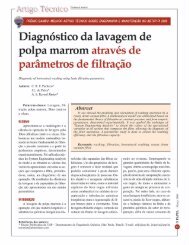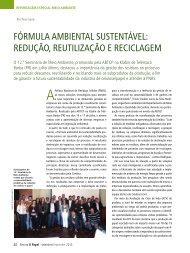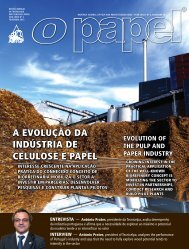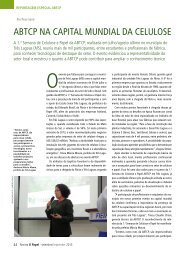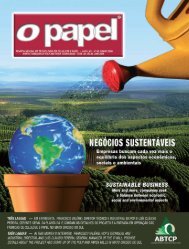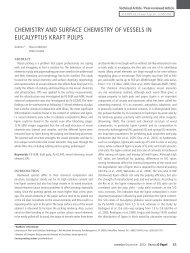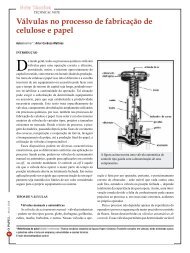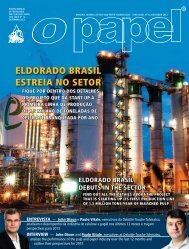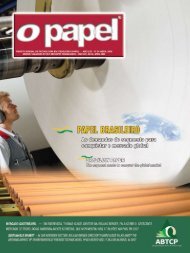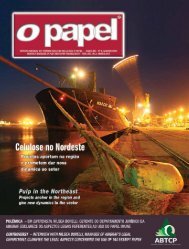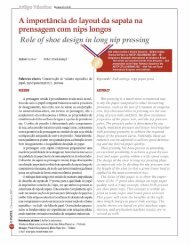Conhecimento é poder. - Revista O Papel
Conhecimento é poder. - Revista O Papel
Conhecimento é poder. - Revista O Papel
Create successful ePaper yourself
Turn your PDF publications into a flip-book with our unique Google optimized e-Paper software.
Cover Story<br />
Trends projected for the sector<br />
Head of IPT’s Pulp and Paper Laboratory, Maria Luiza Otero D’Almeida<br />
characterizes the paper sector as a tuned-in industry, always seeking improvements<br />
to the productive process in order to become more competitive. But today the<br />
challenge of presenting competitive advantages is even greater. “There exists a<br />
permanent movement in the sense of creating products, services, processes and<br />
managerial systems. In other words: to innovate”, she says.<br />
Also according to her, Brazil’s economic situation also favors investments. “Overall,<br />
requests for research and services have increased substantially in recent years”, she says.<br />
For the next couple of years, Maria Luiza points out a few differences among<br />
the paper segments. For being a commodity, the production of printing and writing<br />
paper shall focus on increasing production and improving processes in order to<br />
achieve more competitive prices. “Developments have been made in the paper<br />
for digital printing area, but the main technological advancements will be in print<br />
machinery and inks for printing”, she bets.<br />
In the case of tissue papers, it is important to point out their leap in quality and<br />
growing pursuit of technological innovation underway. “Five years ago, the amount<br />
of specks (dirt) on single-ply toilet paper exceeded 400 mm²/m². Today, this figure has<br />
dropped to around 50 mm²/m²”, compares LPC’s Head.<br />
The improved standard of living of Brazilians has led consumers not only stop using<br />
this type of paper but also value quality. “They are also more aware in terms of caring<br />
for the environment. Requirements from the population are driving the industry and, by<br />
improving the quality of a product, you end up resorting to innovation.”<br />
When talking about specialty papers, Maria Luiza classifies them as the segment<br />
that demands technological development the most, since they are higher value-added<br />
products. However, investments are well below expected. “In Brazil, there still lacks the<br />
habit of investing in research and this doesn’t change from one day to the next. But I<br />
believe it’s already occurring, little by little because in today’s open market, one needs to<br />
be competitive”, she said.<br />
The developments made in thermal paper for tax receipts are pointed out as important<br />
by Maria Luiza. “LPC is the only Brazilian laboratory licensed by the National Council of<br />
Fiscal Policy (CONFAZ) to conduct technical analysis of thermal paper as stipulated in<br />
articles 6 and 9 of COTEPE Act 04/10”, says the head of the laboratory.<br />
At present, a study regarding the permanence of print on thermal paper over time,<br />
applying the principle of Arrhenius, joins four other projects at LPC: control over the<br />
quality of educational books purchased by the National Education Development Fund<br />
and distributed to municipal and state elementary and high schools; study about recycling<br />
paper from educational books, applying a flotation cell in the deinking process; study of<br />
absorption kinetics involving ink and paper in digital printing and the influence of the<br />
sterilization process by gamma radiation on paper packaging for healthcare products.<br />
Economic, Scientific and Technological Development<br />
of the State of São Paulo, the century-old institute<br />
contributes to the development of various sectors in<br />
Brazil. IPT encompasses a total of 12 technological<br />
centers and 39 laboratory complexes.<br />
The execution of tests, analyses and other services<br />
directed at the different types of paper is conducted<br />
by the Pulp and Paper Laboratory (LPC). Maria<br />
Luiza Otero D’Almeida, head of LPC, mentions the<br />
Interlaboratorial Programs (PIs) as a service provided<br />
to the paper industry. “They are aimed at verifying the<br />
performance of individual laboratories and are broken<br />
down into three rounds per year”, she says. “The PI<br />
for corrugated paperboard sheets is in the process of<br />
obtaining INMETRO accreditation. We will then go<br />
ahead with the accreditation process for the paper and<br />
cellulosic pulp PIs”, she said.<br />
Maria Luiza says that LPC’s interaction with the<br />
private sector is considerable. According to her, almost<br />
all domestic plants in the sector participate in programs<br />
offered by the laboratory. This participation also extends<br />
to plants and universities in other Latin American<br />
countries. “Not only paper production companies<br />
interested in researching production methods or making<br />
a new product or improving an existing one can work<br />
with LPC; raw material makers, paper product importers<br />
or any individual who has paper as his or her focus of<br />
studies may contact LPC”, she said.<br />
The Brazilian Society for Technological Innovation<br />
(Protec) is another entity dedicated to boosting the<br />
country’s technological innovation. Founded in 2002,<br />
the nonprofit civil association aims to encourage<br />
institutional representatives of the productive sector<br />
and companies to continuously seek improvement of<br />
innovation development public policies.<br />
“When Protec was created, there wasn’t a single<br />
law that promoted Brazil’s technological development.<br />
So, this became its mission: to create legislation that<br />
would transform the innovation process not into an<br />
isolated action of visionary companies, but rather<br />
a systemic process that encompassed the entire<br />
productive sector”, recalls the entity’s Managing<br />
Director Roberto Nicolsky.<br />
Since then, the goals have been achieved. Protec played<br />
an active role in building the current Legal Framework for<br />
70 <strong>Revista</strong> O <strong>Papel</strong> - junho/june 2011



